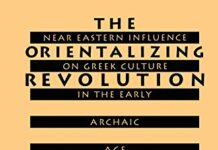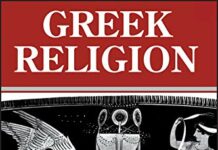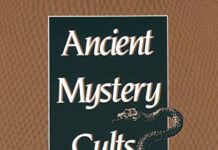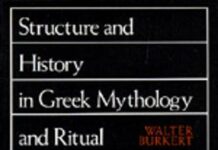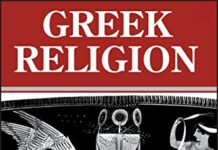
Ebook Info
- Published: 1989
- Number of pages: 181 pages
- Format: PDF
- File Size: 22.96 MB
- Authors: Walter Burkert
Description
The foremost historian of Greek religion provides the first comprehensive, comparative study of a little-known aspect of ancient religious beliefs and practices. Secret mystery cults flourished within the larger culture of the public religion of Greece and Rome for roughly a thousand years. This book is neither a history nor a survey but a comparative phenomenology, concentrating on five major cults. In defining the mysteries and describing their rituals, membership, organization, and dissemination, Walter Burkert displays the remarkable erudition we have come to expect of him; he also shows great sensitivity and sympathy in interpreting the experiences and motivations of the devotees.
User’s Reviews
Editorial Reviews: Review “Walter Burkert’s publication of his 1982 Jackson Lectures at Harvard University is another of his important contributions to our understanding of the religions of Greek, Roman, and Near Eastern cultures. Everything from his pen is welcome and an education… His knowledge of the sources is encyclopedic, his judgment in combining them original, illuminating, and persuasive… This study is bound to become a standard text in the history of religion and in the interpretation of individual experiences in antiquity… This slender but packed volume is another powerful document in intellectual history.”―Emily Vermeule, American Historical Review“The standard book on the subject, encyclopedic in nature, well structured, and readable, all that the interested student and scholar wants to know about ancient Greek polytheism.”―Classical World“Widely recognized as our best scholar of ancient Greek religion…Burkert deals with the evidence directly, clearing away misconceptions and discussing problems of interpretation… Extremely valuable.”―The Key Reporter“Fascinating… The writing is clear and engaging… [Readers will] learn much about how ancient human beings attempted to find security and joy in a difficult world. They will be able to enter, at least partially, into very different minds and glimpse experiences of ecstasy and wonder that took place many centuries ago.”―Judith Amory, Wilson Library Bulletin About the Author Walter Burkert was Professor Emeritus of Classics, University of Zurich.
Reviews from Amazon users which were colected at the time this book was published on the website:
⭐While not as excellent as ‘Homo Necans’ (though few books are).An invaluable addition to the library of anyone studying Ancient Greeks and/or mystery cults.Well written, easy to read.
⭐I find the subject of ancient religions extremely interesting and Burkert gave me a point of view I’ve not read before. He obviously knows his subject and has an opinion on it.I would have given it a five stars but I found it sometimes difficult to follow all of his ideas. Anyone new to the subject might have a difficult time with this book.Question: why are so many of the books on ancient religions so over priced?
⭐I’ve been researching and studying mythology and rites for years, and I was eager to buy this book. It was somewhat of a disappointment. It falls short in information, I found it too superficial. It does cling to one single view of the mystery cults, which also doesn’t help – specially when you’re versed in comparative mythology, or any comparative schools at all. Had I known it would be so poor on details, I wouldn’t have bought it.(And the review is just as short as are the information on the book)
⭐While Burkett is recognized as one of the leading scholars of classical Greece, I found his suppositions about the ancient mystery cults somewhat stretched, and must be rooted in Burkett’s own agenda in speaking with/against previous scholars. Burkett spends the first half of this work questioning long held assumptions about the nature of afterlife belief within the cults, as he examines votive offerings and other miscellaneous archeological data asking what really do such things tell us? But of course such things tell us very little, for which archeology is a soft science filled with supposition.This work is useful as a pause to historical critique and supposition, but ultimately those who speak of the mystery cults in the past (Plato, Pindar, and even Virgil) all make it clear that the cults consisted of rituals and initiations preparing one for the journey in the aftrlife. While we actually know very little about what they actally entailed (actually, we know very little about most of ancient history) the truth is Burkett’s approach is not exceptional, but informative.
⭐The four chapters of this book are taken from a series of lectures that Burkert gave in 1982. They all examine aspects of mystery cults in general rather than each cult individually. The introduction, which describes the Eleusinian mysteries and those dedicated to Dionysus, Magna Mater, Isis, and Mithras, gives the reader the basic background for understanding what follows. The four lectures discuss: how the mysteries satisfied worshippers’ personal religious needs; the communities of initiates in each cult, and how they were organized; mystery cults’ theology, or lack thereof; and what the mystery rites actually consisted of. This structure means that the reader doesn’t get a complete description of any of the individual cults. Instead, Burkert looks at each of them while discussing the main topic in each essay.Burkert challenges many old assumptions about the mystery cults. He expresses skepticism about the use of hallucinogens or other drugs during the mystery rites, saying the circumstances of most rites really weren’t well suited for a drug trip. He shows that the mysteries had no systematic theology and their religious communities were fairly loosely organized. He especially challenges the notion that the mysteries guaranteed a better afterlife for their initiates.A lot of this criticism is justified. Hallucinogen-based mystery rites seemed plausible amid the drug-centered mysticism of the 1960s counterculture, but by 1982 the effects of hallucinogens were well understood, and Burkert was able to point out the dissimilarity between them and the mystery cults. More fundamentally, scholars for generations before Burkert were working with the unspoken assumption that Christianity is the model for what a real religion should be like. To them, the mysteries seemed like half-formed precursors to this type of religion, and they often assumed that the mysteries were more Christian-like than they really were. Scholars in the 1970s and 1980s reacted against these faulty assumptions, and their skeptical views held sway when these lectures were given. Nevertheless, I think Burkert downplayed afterlife beliefs too much, and more recent studies of the mystery cults tend to agree with me.Burkert is often insightful, especially about the psychological phenomena underlying the mystery cults. But this really isn’t a complete examination of the mysteries. A reader looking for one should turn to
⭐by Hugh Bowden, which describes the historical context extensively, or
⭐by Jan Bremmer, which gives straightforward descriptions of the rites and examines them just as thoughtfully as Burkert does. This book works best as a supplement to those two.
⭐Excellent book
⭐impeccableExcellent – but you wouldn’t expect less from Burket.
Keywords
Free Download Ancient Mystery Cults (Carl Newell Jackson Lectures) in PDF format
Ancient Mystery Cults (Carl Newell Jackson Lectures) PDF Free Download
Download Ancient Mystery Cults (Carl Newell Jackson Lectures) 1989 PDF Free
Ancient Mystery Cults (Carl Newell Jackson Lectures) 1989 PDF Free Download
Download Ancient Mystery Cults (Carl Newell Jackson Lectures) PDF
Free Download Ebook Ancient Mystery Cults (Carl Newell Jackson Lectures)
